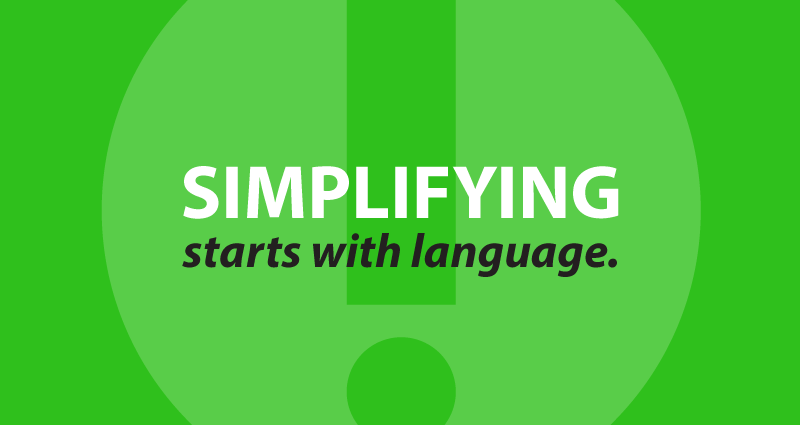
Why credit unions should simplify absolutely everything
We already know that you should pay attention to simplifying copy to lower the reading level on your credit union’s website. It’ll make your site more understandable to everyone, not just brainiacs, and could even give your site an SEO boost.
But that’s just a start. Simplifying the language you use shouldn’t begin and end with your website. Clearer, faster communication brings a lot of other benefits to your credit union and to all your members.
Here are five ways your credit union can benefit from simplifying everything:
You’ll increase service quality and speed
Members and employees who better understand your products and services are happier and more efficient. You reduce misunderstandings and stress all around with simpler, more understandable language. Simplicity is better for your brand.
You won’t seem so weaselly
No one reads disclosures, but they do notice them. An email or web page with a cloud of weasel words at the bottom looks dishonest.
The simplest way to banish weasel words is to rewrite and simplify your headlines and copy so you don’t need lengthy disclosures.
And cut as much of the mumbo-jumbo as you possibly can. Masses of fine print aren’t magic spells for compliance. They’re a significant risk to your brand and marketing effectiveness.
In contrast, simplicity and clarity convey expertise, honesty, and confidence.
You’ll be more understandable for people who use other languages
Wherever you are, I can guarantee a significant portion of your members have a first language that’s not English. And more and more of them are using online translation tools and apps.
If you use simpler sentences, smaller words, write for clarity, and avoid wordplay or idioms, your content will be far more translatable and accessible.
You’ll be better understood by people using translators or reading in their second or third language. (And even native English speakers always appreciate simplicity and clarity.)
Simple is better for the environment
Less ink and paper, fewer mistakes and less waste. It’s that simple. And that’s why simplicity costs less, too.
Simple spreads
Simplified language leads inevitably to simpler products, processes, and policies. For example, think about rewriting your checking account or credit card web pages or brochures. Choosing one should be easy, right?
But simplest of all is no choice. So what’s keeping you from offering one “No Brainer” checking account that includes everything?
If that’s never going to fly, then at least make the decision super-simple with no more than two or three types of accounts. Why not make it easy (or automatic) to switch to the best one?
Same goes for credit cards. The simplest is one card that’s a slam-dunk screaming deal. If you must have more than one, keep the choices simple. Any more than two or three choices is counterproductive as members try to figure out which is best for their needs.
Of course, changing products and policies is a lot more complex than editing copy. But simplifying starts with language. With practice, simplicity becomes a clearer way of thinking and acting, which affects and clarifies policy and product decisions.
What are you going to simplify today?
- OMG! The Overwhelmed Marketers Guide to Year-End - December 4, 2024
- Start Credit Unions to Save Credit Unions - November 7, 2024
- Five ways you’re scaring members away - October 29, 2024
